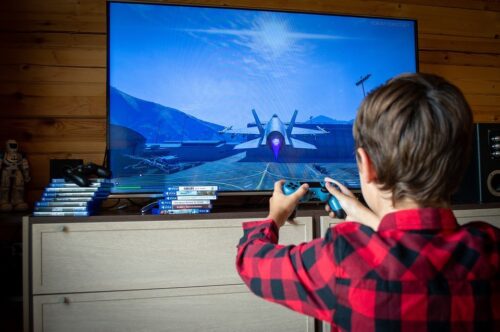
How the definition of “playing” has evolved in a short time is concerning. Back then, playing entailed spending time outside with friends, playing in the sunlight, getting clothes dirty, and returning home sweaty. Nowadays, the majority of children think that playing is equivalent to spending hours playing video games on a desktop or laptop computer, iPad, or mobile while consuming junk food on the side.
It’s common knowledge that kids are huge fans of video games. According to a recent survey, on average, kids play video games for approximately eight hours every week. Even while this may appear like a lot of time, it’s crucial to keep in mind that play is how children learn and grow. What could be the harm in allowing children to enjoy playing video games for a while? It turns out that your youngster might be hooked on playing video games for a number of reasons.
Let us look at the reason children get hooked up in video games.
Video Games Are Fun!
While it might seem obvious, it’s crucial to keep in mind that kids are drawn to enjoyable things. They can be stimulating, demanding, and rewarding. Children might engage in video games more frequently as a consequence of this.
Video games provide children with a sense of accomplishment and acknowledgment while immersing them in new worlds, making them enjoyable, especially in the face of intermittent rewards. Online games can keep children motivated and engaged because of the attention given to details, riddles, and minigames. Video games are like putting imaginations on screen, loaded with supernatural beings, aliens, superheroes, monsters, mythological creatures, and a range of breathtaking scenery. This is why video game addiction in itself is not that surprising. Additionally, they allow your kids’ players to truly be part of these fantasy environments.
A gaming experience is also just one big goal-chasing pursuit. Video game time is a constant source of excitement for children, whether it’s the underlying plot in your kids’ favorite adventure game played in single-player mode or the competition to win in any kind of sports game. Gamers can virtually live a life that kids would never have the opportunity to experience through video games.
Examine sudoku, crossword puzzles, and other easy games as well. Your kids have access to some of the most entertaining brainteasers when you combine video games’ interactive and graphic aspects. They feel better and more fulfilled as a result of these boosting their excitement during their screen time.

Video Games Can Improve Problem-Solving Skills
A lot of kid-friendly video games demand children to solve puzzles in order to progress. Their ability to solve challenges will be enhanced, which will benefit them in other aspects of their lives. Children who play video games develop quicker, more precise allocation of attention skills, which improves their capacity to prioritize tasks and determine where their focus should be at any given moment.
Playing video games is primarily a mental activity. Most of the time, it entails devising a plan of action to escape or outwit an opponent, construct a building, or destroy one up. Because of this, it’s a pretty active hobby, at least mentally. Numerous academics and medical professionals have acknowledged this, and video game concepts are still used in training scenarios, rehabilitation, and other brain-training activities.
Gamers may gain knowledge from the errors they make by playing video games. They continually adapt to the surroundings of the game, which is an essential life skill. Children who regularly play video games will go through a process known as deep mental exercise. These games help kids solve problems more effectively because they let them experiment with a variety of activities without having to spend a lot of money. Children learn from video games that attempting new things doesn’t necessarily hurt and that answers are only sometimes simple to understand.
Video Games Can Boost Self-Confidence
The ideas of creativity and self-expression are prevalent in video games. Playing videogames helps to build neurological networks by combining concentration with neurotransmitter spikes, which gives the brain an actual exercise. Kids can hone their abilities with these games and ultimately feel proud of themselves. For kids who might not succeed in other aspects of their lives, this can be tremendously empowering.
Children’s brains may reset and recover wasted energy by playing video games. They give their all to the game they are playing, and with that, they are rewarded for their efforts when they achieve certain goals. Additionally, this enables their brain to solve problems and make new connections, thereby making them feel more confident. The kids get better at a game if they play it over extended periods of time. It inspires them to design their own gaming experience that conveys a narrative or a feeling. It increases children’s drive and gives them the chance to believe they are intelligent and capable.
Children receive feedback in video games nearly instantly. As a result, there are times when individuals may truly experience discouragement if they are unable to finish or pass a level. Frustration and emotional strain may result from this. But when children get the hang of it, playing games improves their ability to process emotions and helps them regulate their emotions. Playing video games can be a useful coping mechanism for stress and bad emotions. These can help with the growth of self-awareness and confidence since they foster an achievement paradigm.
Video Games Can Be A Way For Escape
Kids who struggle with peer pressure, anxiety, and fear typically prefer to withdraw from others. They may desire to engage in gaming experiences because they feel protected and shielded from criticism from others. And because they are under so much pressure from their peers and teachers, they search for a better environment where they don’t have to be concerned about anything – thus a video game experience.
Playing games offer a means of distraction or escape from the outside world to some kids. They may serve as a haven for kids where they may have fun and forget about their troubles. This may be particularly valid for those who are experiencing anxiety or sadness. Children’s commitment to gaming may also stem from their perception of it as a way to relax. It turns into a coping mechanism for the unpleasant thoughts and emotions children frequently have when they’re bored.
When kids experience the constant flow in brief periods, they may find it difficult to interact with others. However, they can still integrate into an environment where people still communicate and look out for one another by playing video games. One of the primary explanations for why your children play as often is due to the sense of connection to others that games foster.
Kids that play games have a mission, a purpose, and something to strive for. This gives your kids a sense of significance in life that they might not find elsewhere.

Video Games Can Improve Hand-Eye Coordination
Playing video games can help your children become more creative and relaxed. However, hand-eye coordination is the best aspect of it. Quick reflexes are essential for playing real-time movement-based video games. These motions, whether made with a controller, mouse, and keyboard or using your finger on the touch screen, can aid in the development of precise hand-eye coordination. The eye muscles are worked out by rapidly moving and focusing, and it can also aid in enhancing visual clarity.
Kids are required to use their hands in order to control the activity on-screen in several video games. Enhancing their motor abilities can benefit them in several aspects of their lives. Playing video games can greatly impact children’s performance, which can help them enhance their core balance and coordination skills. The children’s bodies and minds get more flexible and stronger during the warm-up before the real video game begins.
Without a doubt, video games have a good impact on sensorimotor functioning. Video games that require throwing, balancing, and catching provide opportunities to practice this ability and develop new skills. Through the stimulation of the eyes, the brain receives visual information, which it then uses to figure out which muscle motions are necessary at any given moment. Children’s reaction times and processing speeds, which are necessary for navigating and preventing falls, may be accelerated by video game play.
Insight
Knowing why your kids play games is crucial because it enables you to support them in reaping the same mental and emotional benefits from other hobbies. It also enables you to approach things with positive reinforcement rather than disapproval and anger. This positive approach can help you connect with your children. Because gamer children are inherently protective of their games, you need to build rapport with your child with the goal of having any kind of influence on their decisions in general.
But it’s important to be careful. The Diagnostic and Statistical Manual of Mental Disorders details real-life consequences of too much gaming time on children’s brains. The Diagnostic and Statistical Manual of Mental Disorders recommends that parents and guardian adults introduce other activities to children depending on their age. Limiting video game time, TV, and online activity can have a positive impact on a child’s life. But it’s also important to let them continue playing in moderate amounts, especially if the child has met good friends online.
Having a discussion with your kids about the reasons behind their game-playing is the next step. Although you may have already done this and probably talked to them about your proposed conditions, it would be best if you approached this from the perspective of curiosity rather than judgment. See how else you can incorporate these motives into your children’s daily lives using the reasons listed above as a guide so you can allow your kids to play video games.